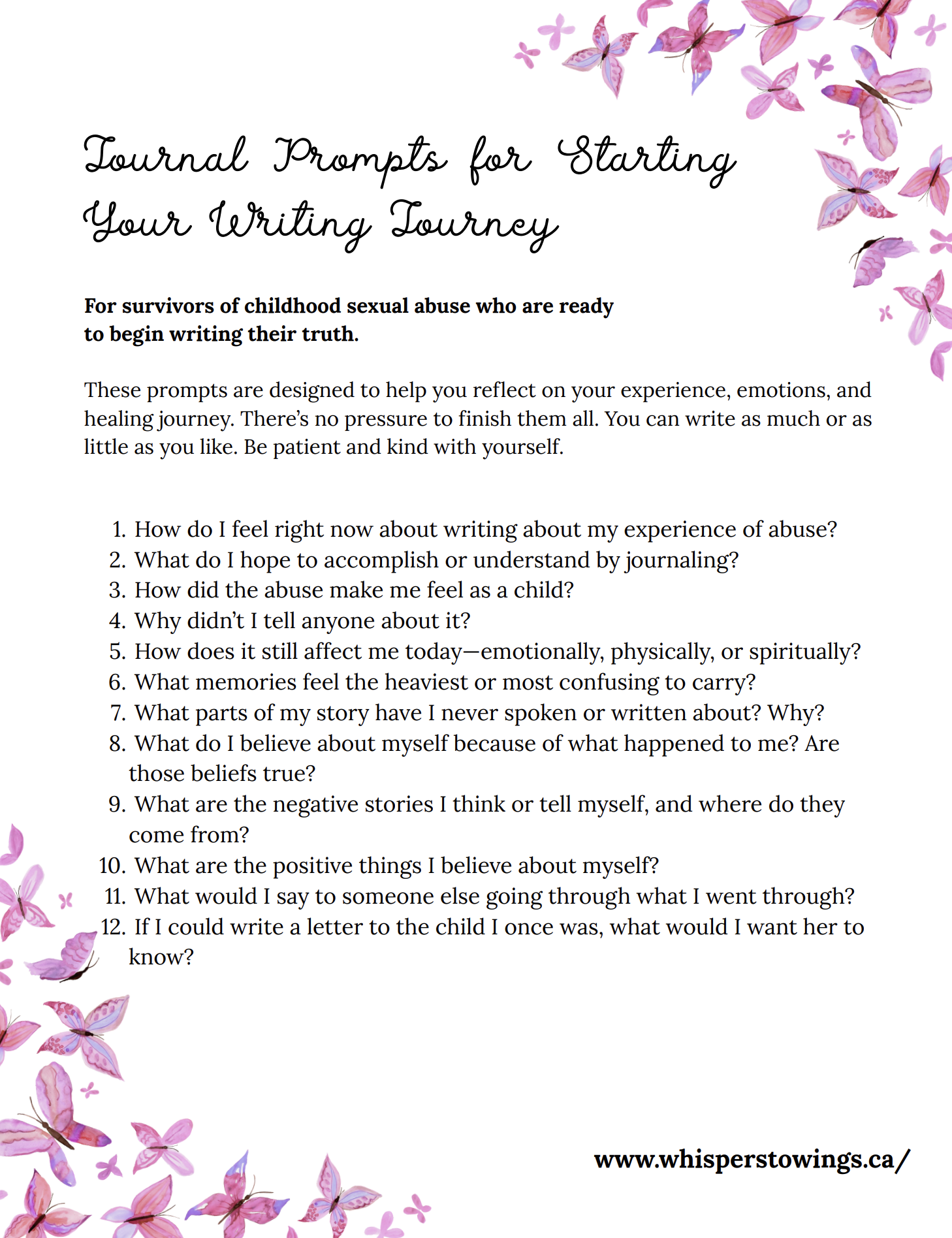The Healing Power of Journaling for Survivors of Childhood Sexual Abuse
Your Journey Towards Healing Can Begin on the Page: Why Journaling Matters
Journaling is a simple yet profound tool that has helped countless survivors of childhood sexual abuse (CSA) on their path to healing. It provides a private, safe space where you can be completely honest about your emotions without fear of judgment or misunderstanding. For many, the act of writing can be the first step in beginning to process deeply buried feelings. When verbalizing your experiences feels too daunting, journaling offers an alternative way to explore and express your truth.
How to Start Your Healing Journey Through Writing
Be Honest with Yourself
The key to effective journaling is honesty. Allow yourself to write with authenticity, even if your emotions feel messy or confusing. You might not fully understand your feelings at first—that’s okay. Many survivors have suppressed their emotions for so long that identifying how they truly feel can be challenging. Use journaling as a way to explore these complicated layers of emotion.
2. It’s Okay to Feel Confused
As you begin writing, you might notice a whirlwind of emotions rising to the surface. Feelings of anger, sadness, guilt, or even numbness may emerge. Remember that these emotions are valid, and allowing yourself to feel them is part of the healing process. Journaling can provide a safe outlet to express difficult emotions without fear of being misunderstood.
3. Understanding the Stories We Tell Ourselves
As children, we often don’t fully understand the experiences we go through. Survivors of CSA may create false narratives about their abuse, such as believing, “I’m bad,” “I’m to blame,” or “It’s my fault.” These stories can linger into adulthood, reinforcing shame and guilt. Through journaling, you can begin to unravel these narratives, acknowledge what happened, and start to rewrite your truth. By putting your feelings and experiences into words, you gain clarity and the opportunity to challenge those old, harmful beliefs.
4. Acknowledging Your Feelings
Writing about your CSA experience is not just about recounting events; it’s about acknowledging your emotions surrounding those events. It’s important to remember that feeling emotions, even the painful ones, is a good thing. Many survivors have spent years suppressing their feelings, but journaling allows you to reconnect with yourself and process those emotions in a meaningful way. This can be a crucial step in reclaiming your voice and your sense of self.
5. How Journaling Can Complement Therapy
While journaling can be an incredible healing tool on its own, it can also work hand-in-hand with therapy. A therapist can help you explore the emotions you uncover through your writing, offering guidance and support as you navigate your healing journey. Together, journaling and therapy can create a powerful combination that helps you process your experiences and move forward.
Be Kind to Yourself Through the Process
Embrace Patience
Journaling can be emotionally demanding, especially when you’re addressing years of buried feelings. Be kind to yourself as you navigate this process. You may need extra rest to recharge emotionally, and that’s perfectly normal. Healing takes time, and it’s important to honor your own pace.
Allow Yourself Time
Remember that you’re not unloading just a day or a week’s worth of emotions—you may be confronting years of hidden pain. Journaling is a gradual process, and there’s no need to rush. The most important thing is to begin, no matter how small the first step might feel. Whether you write a single sentence or fill several pages, every word is a step toward healing.
Practical Tips for Starting Your Journaling Practice
Start with a prompt: Questions like “What do I fear will happen if I tell?” or “How do I feel about keeping the secret?” can help you get started.
Write without judgment: Let your thoughts flow freely. There’s no right or wrong way to journal.
Set aside time: Dedicate time each day or week to write, even if it’s just for a few minutes.
Be patient: If words don’t come easily at first, that’s okay. Give yourself grace as you ease into the practice.
Conclusion: Your Healing Matters
Journaling is more than just an act of writing—it’s an act of self-love and courage. It’s a way to honour your truth, explore your emotions, and take meaningful steps toward healing. Whether you’re not yet ready to talk about your experiences or you’re looking for an additional tool to complement therapy, journaling can be a powerful resource on your journey. Above all, remember to be gentle with yourself. Healing is not a race; it’s a deeply personal process that unfolds in its own time.
Your story matters. Your emotions matter. Your healing matters. Begin where you are, and let the page be a safe space for your journey.
Are you ready to start writing?
If you find it hard to start writing, you’re not alone. Many survivors feel overwhelmed, blocked, or unsure of where to begin.
Journaling can feel vulnerable, especially when you're writing about painful experiences.
Remember, it doesn’t have to be perfect. You don’t need to write complete sentences or tell your whole story at once. Just begin with what’s on your mind.
Download our free Journal Prompt sheet and explore the hidden thoughts, memories, and feelings as you start your journey towards healing from childhood sexual abuse.


